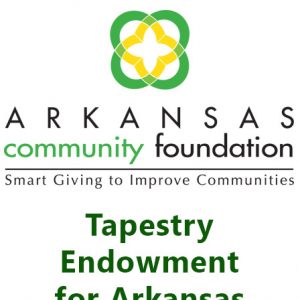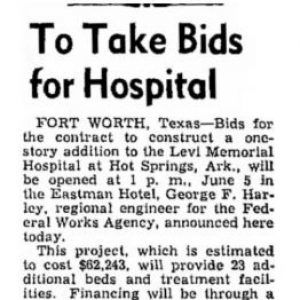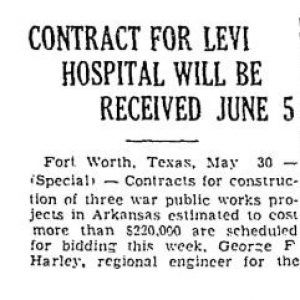calsfoundation@cals.org
Levi Hospital
aka: Leo N. Levi Hospital
Levi Hospital in Hot Springs (Garland County) is a nonprofit hospital that offers mental and physical therapy. Its mission is to provide specialty care for the residents of Hot Springs and surrounding communities, serving patients without regard to race, religion, creed, national origin, gender, age, disability, or economic means. It has a history of providing services to people regardless of their ability to pay. Levi Hospital is the only healthcare provider in Garland County that provides inpatient adult psychiatric services as well as rehabilitation therapy in the thermal waters of Hot Springs National Park. It also offers a certified athletic trainers program for area schools in which trained healthcare professionals are present at athletic practices and games to help prevent and treat injuries such as concussions and spinal cord damage.
Rabbi A. B. Rhine of the House of Israel synagogue in Hot Springs realized there was a need for a hospital to serve the many poor Jewish people who sought the unique healing benefits of the area’s thermal springs. Many Jewish visitors from around the nation also came to Hot Springs to “take the waters” for their health. The local chapter of B’nai B’rith (“Children of the Covenant”), a Jewish service organization, proposed a B’nai B’rith hospital in Hot Springs at the group’s 1903 regional convention. Winning support, it approached the national B’nai B’rith in 1910. The idea was received so favorably that the national organization assessed all of its members twenty-five cents each to help pay for the project, in addition to $2,500 donated by the Hot Springs chapter.
The Leo N. Levi Hospital was founded on November 4, 1914. The hospital was named after distinguished attorney Leo Napoleon Levi (1856–1904), a beloved past president of the national B’nai B’rith. Although it was funded by B’nai B’rith and kept a kosher kitchen, the hospital accepted patients of all faiths. The majority of its patients over the years have not been Jewish.
It was renowned as the first national Jewish hospital to specialize in rheumatism and diseases of the blood. At the time of its founding, its primary purpose was to treat conditions such as gout, nephritis (inflammation of the kidneys), rheumatic diseases (pertaining to the joints and connective tissue), and venereal diseases such as syphilis.
Nurse Regina Kaplan (1887–1957) became the hospital’s administrator in 1916, remaining in that position for thirty-five years. Along with overseeing the hospital’s growth from twenty-five beds to 125 during her tenure, Kaplan established the Leo Levi Hospital School of Nursing, which existed until 1952.
Hot Springs continued to be a popular tourist destination until a post–World War II crackdown on illegal gambling in the city coincided with rapidly expanding medical advances around the country. These factors led to the decline of Hot Springs as a destination for both health-related visits and tourism in general. However, Levi Hospital diversified and continued to grow. In the twenty-first century, it offers services such as outpatient physical rehabilitation, including physical therapy and occupational therapy to help patients recover from accidents, strokes, and surgery. It features a 3,000-square-foot gym with a pool fed by the thermal waters of Hot Springs National Park.
Levi Hospital’s sports medicine clinic offers treatment for sports-related injuries. It also provides athletic trainers for local schools, on-field coverage for home games in area schools, and specialized trainers who make designated school visits. Levi Hospital also offers an arthritis treatment clinic, osteoporosis testing and treatment, inpatient adult psychiatric services, and an outpatient psychiatric program called Transitions. It also offers a licensed assisted-living facility, long-term care facility, and individual homes for independent living. Inpatient treatment is available for seniors and adults with mental health conditions through its geriatric/adult psychiatry program. In a joint effort with interfaith volunteers, Levi Hospital operates an adult day respite program centered around Alzheimer’s patients.
Levi Hospital is accredited by major boards including the Joint Commission on Accreditation of Healthcare Organizations. The eighty-one-bed hospital is licensed by the Arkansas Department of Health and is a member of the American Hospital Association.
For additional information:
LeMaster, C. “Regina Kaplan: Arkansas ‘Lady with the Lamp.’” Unpublished manuscript, 1987. American Jewish Archives, Jewish Institute of Religion. Hebrew Union College, Cincinnati, Ohio.
Levi Hospital. http://www.levihospital.com/ (accessed September 27, 2021).
Levi, Leo N., and Independent Order of B’nai B’rith. Memorial Volume: Leo N. Levi, I.O.B.B., 1905. Charleston, SC: Nabu Press, 2012.
Records of Leo N. Levi Memorial Hospital (Hot Springs, ARK), 1917–1983. American Jewish Historical Society, New York, New York. Finding aid online at http://findingaids.cjh.org/?pID=1384705 (accessed September 27, 2021).
Thomason, Don. “Hot Springs Hospital’s $1,355,000 Gift—Why?” Arkansas Democrat-Gazette, November 25, 2011, p. 5B.
Waggoner, Dan E. Levi Arthritis Hospital: More Lasting Than Marble or Stone. N.p.: N.d.
Nancy Hendricks
Garland County Historical Society
 ACF Logo
ACF Logo  Levi Memorial Hospital Construction Article
Levi Memorial Hospital Construction Article  Levi Hospital Addition Announcement
Levi Hospital Addition Announcement 



Comments
No comments on this entry yet.